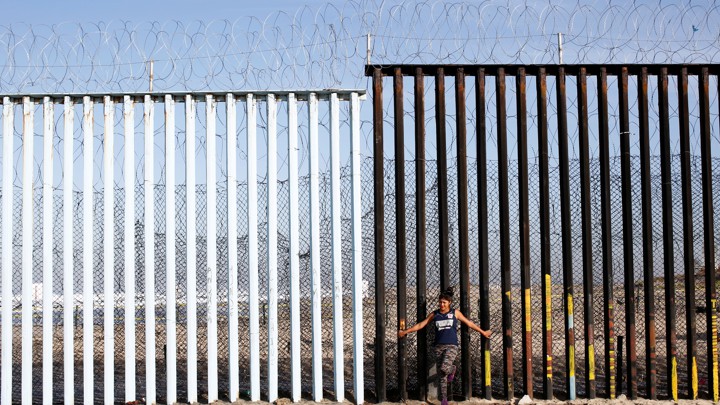Trump Persuaded Mexico to Shelter Asylum Seekers - The Atlantic
And it’s not securing funding for a border wall.
7:00 AM ETContributing editor at The Atlantic and executive editor of National Review
 Kim Kyung Hoon / Reuters
Kim Kyung Hoon / Reuters
President Donald Trump seems determined to force a government shutdown over partial funding for his proposed border wall, and it is not hard to see why. As Mark Krikorian, the director of the Center for Immigration Studies, a restrictionist think tank, observed in an interview with The Washington Post, Trump is exquisitely sensitive to ridicule from those he sees as his staunchest supporters.
As Trump’s political standing diminishes, those on the restrictionist right who’ve put their faith in him have grown less admiring and more acerbic in their assessments. The columnist Ann Coulter, who some have identified as the inspiration for Trump’s own restrictionist turn, has gone so far as to denounce the president as “gutless” for his lassitude in building the wall, and she is far from alone. Forcing a shutdown would dramatize his supposed commitment to the wall, which, for a president deeply invested in appearances, is what matters most.
Yet when we leave appearances aside, the Trump administration has accomplished something that, in the long run, is of far greater consequence than securing a $5 billion down payment for a physical barrier that, for all its symbolic resonance, will have no appreciable effect on asylum seekers or visa overstayers, and will likely fail to deter the most determined clandestine border crossers. To the surprise of many observers, senior U.S. officials appear to have persuaded the Mexican government to shelter Central American migrants who are seeking asylum north of the border. This is, in essence, the “Remain in Mexico” plan that was being discussed in late November, shortly before the inauguration of Mexican President Andrés Manuel López Obrador—except the U.S. and Mexican governments are both insisting that this is not a formal agreement.
Read: Trump keeps invoking terrorism to get his border wall
Both parties are describing the move as a unilateral decision by the U.S. that in turn has elicited a humanitarian response from Mexico. Though no one on either side is suggesting that there’s been some quid pro quo—one assumes that Trump doesn’t want to be seen as bribing Mexico, and López Obrador doesn’t want to be seen as having been bribed—it hasn’t escaped notice that the U.S. reportedly promised new development assistance to help improve living standards in Central America and southern Mexico, a high priority for López Obrador throughout his long political career, just two days before the Mexican government announced its new policy.
Why is this tacit agreement so significant? Previously, asylum seekers were routinely granted permission to live and work in the U.S. as they awaited their court hearings. Because the U.S. asylum system is so severely backlogged, this has often meant that they could remain in the U.S. lawfully for years, regardless of the merit of their asylum claims. One result is that a large and growing number of Central American migrants have chosen to go through the formal asylum system rather than enter the U.S. without authorization, a far riskier path that, among other things, can limit access to social services.
Under the new dispensation, most asylum seekers will instead be expected to remain in Mexico, and the Mexican government has declared that it will grant them work authorizations and the right to travel freely between Mexico and their native countries as they wait. Considering that even the highest, most technologically sophisticated wall can’t prevent migrants from lawfully seeking asylum, the cooperation of the Mexican government is absolutely essential to controlling Central American migrant flows to the U.S.
Quinta Jurecic: Trump’s state of exception
Many observers were skeptical that such a deal could be struck, even if only informally. And it may yet unravel, especially if Trump further antagonizes Mexico’s nationalist government, which is keenly aware that its ability to control migrant flows gives it a great deal of leverage. One way or another, the U.S. needs to reform its outmoded and overwhelmed asylum system. What Mexico has done is give the Trump administration much-needed breathing room, and a path to a more cooperative relationship.
But rather than cement this fragile compromise with Mexico by, say, showering López Obrador with praise and calling for a new immigration agenda that would bring inflows under control by spreading prosperity throughout the region, Trump has chosen a different course of action. Once again, he will rage against congressional Democrats for refusing to fund a border wall that they feel quite confident in opposing, the heroic efforts of Vice President Mike Pence and the ubiquitous Mick Mulvaney notwithstanding. Then, after an interval of uncertain duration, he will cave as the political toll mounts, just as his detractors on the right are now predicting. Restrictionists have every reason to question their faith in their decidedly flawed champion.
We want to hear what you think about this article. Submit a letter to the editor or write to letters@theatlantic.com.
is a contributing editor at
The Atlanticand executive editor of
National Review.He is the author of
Melting Pot or Civil War? A Son of Immigrants Makes the Case Against Open Borders.